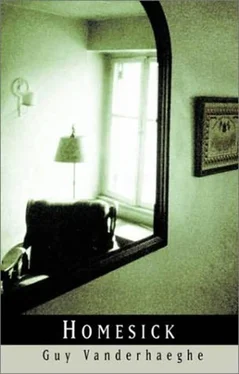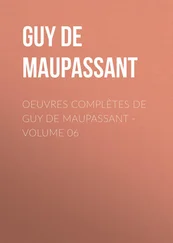Past the peaceful houses Vera and Daniel marched, past the yards hedged with lilacs and caraganas and smelling of grass and shade. They turned into Main Street and there the sun lay harsh and glaring on the cement sidewalks, the stucco storefronts, the plate-glass windows. The druggist had forgotten to roll up his torn awning and it was lazily puffing and popping in a breath of breeze. There was evidence the farmers had been to town the night before for Saturday night shopping. Plenty of cigarette stubs, Copenhagen snuff cans and Lucky Elephant Popcorn boxes lay in the gutters opposite wherever an auction poster had been tacked to a streetlight pole. Only a single car was parked on the street. It stood where it had all night, outside the hotel, directly in front of the beer parlour entrance. Huff Driesen had been too drunk to drive home to his daughter’s and was sleeping on the sofa in the hotel lobby.
“I wish I had a can of white paint and a brush,” said Vera. “All she’s got for a marker is one of those iron crosses and by now it won’t have a fleck of paint on it. It’ll be nothing but rust. You have to whitewash those things regular – once a year, or they go to pot.”
Daniel did not respond. It was a way of expressing his reluctance to join wholeheartedly in her expedition. All the same, he had to be careful not to provoke one of his mother’s famous explosions of temper by an outright exhibition of defiance. He was treading a dangerously fine line, but he’d had some practice at it.
Once they had crossed the railroad tracks, only a few derelict shacks straggled on either side of the road. Here, outside town limits, by-laws did not apply and the yards held chicken runs and chicken coops, or lean-tos sheltering a cow. In front of the last house a gaunt red horse tethered to a discarded tractor tire lashed its tail to discourage flies and despairingly nuzzled ground that had been cropped black and bare of grass. A flock of small children hunkered in a patch of dirt before their door and stared as Vera and Daniel went by. The youngest, a boy of about three, suddenly yelled, “Pigshit!” in a challenging manner.
“Ignore him,” said Vera.
Then they were in open countryside, pasture and poplar bluffs. Vera pointed to a prominent rise about a mile distant. “That’s it. That’s the Protestant Cemetery.”
Despite the earliness of the hour, Daniel could sense the heat building insistently. There wasn’t a cloud in the sky. He was thirsty. He squinted at the rise. It seemed an awfully long hot walk there and back. Nor was it any piece of cake hauling the scythe. It was nearly as tall as he was.
“Your grandmother would have expected her grave to be kept clean and neat. She was a lady that demanded respect, and in my books the dead are owed every bit as much respect as the living. It’s not too big of a sacrifice to spend a little time tidying on a Sunday morning, is it? And God knows the last time that happened.”
Daniel fell farther behind his mother and the sound of her voice. He was dawdling, swatting the heads off Canada thistle with the scythe. The keen blade went through weeds and the tough prairie grass like a hot knife through butter. Roadside and ditches were spotted with colour. Purple clover, wild blue flax, yellow goat’s beard, white yarrow, and cow parsnip were sprinkled everywhere. Over the bright flowers bees hovered and droned and brighter butterflies flitted. The air was electric with a crackling and buzzing and thrumming of insects hidden in the undergrowth. Daniel felt as if he were moving in an atmosphere charged with static, walking on legs that the heat was draining of energy, turning water-muscled, draggy, listless.
His mother, on the other hand, seemed to be stepping out more and more briskly; the head of her hoe was bobbing and jerking smartly up and down over her shoulder. She kept up a running commentary on his snail’s pace, tossing out remarks. “It’s surprising how soft city boys get and afraid of work. Take my advice, Daniel, and leave off whacking the weeds in the ditches and save your strength for the ones up top. Anyways, weeds on the road allowances are a municipal responsibility. They’re no concern of yours.”
He adopted the wisest course, gave it up, slitted his eyes, propped the scythe on his shoulder, and shambled along in the dust a little more quickly.
They began to encounter traffic; farmers from south of town headed for church. First came Catholics bound for ten-thirty Mass; a little later, worshippers at the United Church. Both denominations were equally and impartially cursed by Vera, even though they reduced speed to avoid spraying Daniel and her with gravel and to gain themselves a look. Vera described it as “a slow-motion gawk.” Car after car and truck after truck went by at a crawl, passengers unabashedly crowding forward behind the glare on the windshield to gaze curiously at the curious pair. Even though they were never recognized and identified, this did not prevent the man behind the wheel in his Sunday best from waving. Country manners demanded a salute even to strangers, although apparently women and children were under no obligation to offer this courtesy, only the driver. As the automobiles slid by, churning up clouds of fine, shifting yellow dust, the man of the house raised a hand in greeting as the others gaped and craned their necks. Vera nodded curtly back while she muttered ill-naturedly under her breath, “Fill your eyes. Two clowns minus the circus, but it’s free – which is the price a farmer likes.”
Finally the parade of cars dwindled away to nothing and they were once more alone on an empty road. A hawk sat on the crossbar of a telephone pole next to a blue-green glass insulator, high-stepping it from one foot to another, opening and spreading its wings, folding and refolding them. When they were twenty yards off it took flight, casually, without alarm. In back of them the church bells of Connaught began to peal: the Catholics’ real bell, tolled by the church janitor, then the United Church’s up-to-date summons to worship, recorded bells played over a loudspeaker. By now the graveyard was near at hand. Vera led them off the main road and on to a narrow trail which crept up the cemetery slope, a trail just wide enough to accommodate the one-way traffic of bereavement. Although the hill was not very high, it was steep, and both Vera and Daniel found themselves leaning into it, their eyes on their feet and the fine, floury dust which rose about their ankles with the impact of each plodding footfall. At last Vera was beginning to show the effects of the heat and the climb. Her arms, bare in a sleeveless blouse, shone with a film of sweat and Daniel could plainly hear the sawing of her breath.
“God,” she said, “a stroll up this bugger makes you feel ready for the permanent lie-down up top.”
Up top, however, it felt a little cooler; the air was moving. Vera cast her eyes about her as she recovered her breath. “It’s a little iron cross,” she explained to Daniel. “The grave was on the edges somewhere. She was pretty much off by herself.”
They began a search. “Look carefully,” said Vera. “It was only a little iron cross. It may have fallen over, or been choked with growth.” She was striking at tussocks of dry grass with the hoe, hoping to hear the sound of metal striking metal. “Somewhere on the edges,” she repeated. But after two complete circuits around the graveyard they still hadn’t discovered what they were looking for.
Daniel had a thought. “A lot of people die in twenty years,” he said. “She wouldn’t be on the edges anymore. I mean she’s likely surrounded by now. Dead people all around her.”
They drifted farther in, amid the crowd of headstones. “It’s a little iron cross,” his mother kept saying, “and if he painted it every year, it could be white.”
Читать дальше












